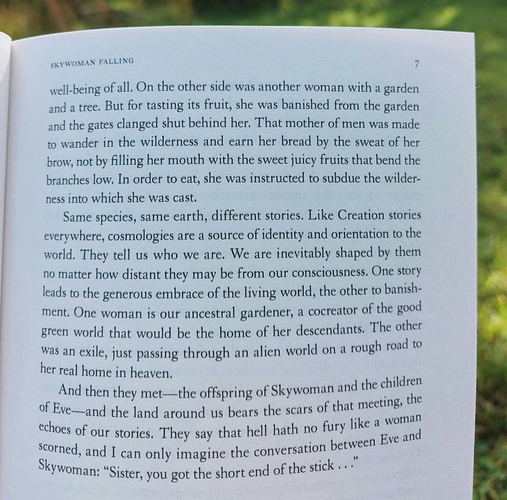Part 2 Comment - distilled into 2 areas: first, continuation of this thing about TRoosevelt; second, deterministic inevitability.
Corey, I’m pushing the Roosevelt point here because there’s something highly significant that still isn’t clarified. You speak of “ the painful irony that (Roosevelt) shared with the American Indians a fundamental appreciation for “sacred naturalism”. OK. Let’s play it out:
Roosevelt, to the Indians: “The land that your ancestors have called home for 5,000 years is beautiful and sacred.”
Indians: “Thank you. We think so, too.”
TR: “I love your land so much and think so highly of it that I’m going to take it from you, because my God wants me to, and I will kill any of you that get in my way. But I will make sure to appreciate the beauty of nature along with you, you sub-human scum.”
There is no Venn diagram overlap with TR and Indians; it’s two completely different things. Red apple, red fire-truck; two things. It’s like holding a portrait of Hitler against the face of a Jewish patriarch admiring the similar jawline. In addition to reflecting deep ignorance, it reflects deep disrespect, intended or not, and it needs to stop.
There’s another point that I think you are not getting about the contextual differences between TR and Indians. It reflects the epistemological oil/water relationship of Roosevelt/Indians. TR is the epitome of Modern, rugged individualism and God-given dominion over nature; and that, in all regards, is in utter and total conflict with American Indian relationship of mutuality with nature. That difference – it’s epistemological, a difference in kind.
In my post, I thought you could tell that I was not asking you about those specific historical catastrophes, but was just listing them as representative of world horrors. Thanks for your individual attention there, but not what I meant. (Or were you being facetious?) Also, I am not going to take or follow this into idiosyncratic Integral or SD theories (yeah, I know, even though it’s a kw site) because those specifics are not relevant to my points here.
But I do get what you mean.
You are saying that not only was it inevitable that TR impose extreme violent actions against Indians, (assessed anyway you want), but that it was spiritually inspired eg Manifest Destiny.
In addition to TR, this deeply concerning issue involves a basic philosophical foundation that kw lays out and you plug it in when you repeatedly say, “I continue to believe that same violent imperialistic epistemology was also very much an inevitable product of history” and you say “many or most of the events you listed do seem to be somewhat inevitable” and you say “As for those other historic events, they feel like they are fixed points, in a certain way” and you say “historic inevitability.”
**** Rearview-deterministic-inevitability is always accurate. And if that’s what you are looking for, pathogenic causations can everywhere be made to glisten; that is a very Modernistic thing to do. Every event of every moment of history can be framed, (or punctuated, in Bateson’s terms) in that manner, and any chosen horror will be justified by the historical conditions surrounding it, in which it arose. It means nothing because it applies to everything, and if that is your default position, the effect is to kill all dialogue. ****
Corey, it seems to me, following an Integrally informed perspective, as you are interpreting, the basic response to any harm would be “Given the immediate and historical circumstances, your harm is an inevitable product of history; sad, unfortunate, but inevitable.” This descriptive dynamic would presumably apply across the board, whether the harm is to a rape victim, war crime victims, 9/11 victims, financial fraud victims, Palestinians, Indian tribes, Jews.
Oh, and South Africa; they didn’t accept violent-imperialism-as-an-inevitable-product-of-history. The perspective of rearview inevitability would undercut the philosophy behind ‘Truth and Reconciliation’ commissions throughout the world. “Since it was inevitable, we can all just turn out the lights and go home; what’s the point, or the use, of talking about it since it was predetermined? It amounts to, ‘You want to talk about it, talk to God’.”
In this context that you construct, one of deterministic inevitability, the whole notion of Truth and Reconciliation falls apart. Your position is that it was all God’s will, after all. A very vengeful, hateful vindictive Christian God, but a God nevertheless – the Manifest Destiny kind of God that your position continues to vitalize. Note, this is not the same as saying that they thought it was God’s will – obviously a bunch (but far from all) did think that. Here, you are going beyond that; you are actually vetting it as a viable truth. You are agreeing that it was, in fact, God’s will, or spiritually inspired. Is that really your intent?
Personally, I consider Manifest Destiny an evil of epochal proportions which represented nothing more than a lo-ball capitulation to greed and deceit, even by standards of that day. Volumes have been written on alternatives to the genocidal narrative of Manifest Destiny.
 –I too appreciate that he loved and wanted to protect wild and beautiful places as National Parks–but I wanted to “connect the dots” between those discussions: that connection being that it was Teddy Roosevelt who dissolved Indian territory in Oklahoma, making way for Oklahoma’s statehood in 1907.
–I too appreciate that he loved and wanted to protect wild and beautiful places as National Parks–but I wanted to “connect the dots” between those discussions: that connection being that it was Teddy Roosevelt who dissolved Indian territory in Oklahoma, making way for Oklahoma’s statehood in 1907.


